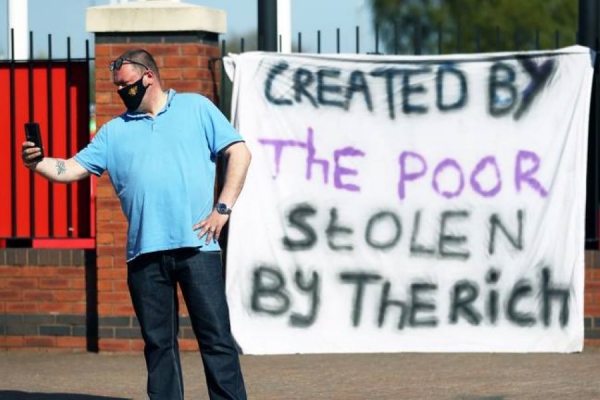48 Hours That Shook the Game
Written by Shaun Duffy'We are going to help football at all levels to take its rightful place in the world. Football is the only global sport in the world with more than four billion fans and it is our responsibility as a big club to respond to the wishes of the fans.' Florentino Perez – Chairman of the Super League 18/04/2021
Shortly after 11 pm on Sunday 18 April 2021, twelve clubs from three countries came together to drop football’s biggest bombshell since the formation of the Premiership in 1992. It was confirmed that the ‘dirty dozen’ Arsenal, Chelsea, Liverpool, Man City, Man United, Tottenham Hotspur, Atletico Madrid, Barcelona, Real Madrid, AC Milan, Inter Milan and Juventus had agreed to join, as founding clubs and permanent members, the newly formed European Super League – drawing worldwide outrage and condemnation from UEFA, FIFA, the Premier League, the Spanish Football Federation, the Italian Football Federation, the Government and supporters all over the country.
And so it began. 48 hours of madness and the imbroglio of a controversy triggered by the shortest attempted coup in world football.
Due to commence in August, the 20 club midweek competition was comprised of 15 clubs, with three more permanent members expected to join and then a qualifying mechanism for another five teams to join annually based on achievements in the previous season.
Teams would play each other home and away in two groups of ten, with the top three in each group automatically securing a place in the quarter-finals.
Fourth and fifth-placed teams from each group would have then competed in a two-legged tie for the remaining quarter-final berths. The latter stages of the league would see teams play in a two-leg knockout format that would have concluded with a final at the end of May in a one-off game at a neutral venue.
The league, financed by world renowned investment banker JP Morgan, would have seen founder member clubs share a £3 billion pot, with each club receiving an initial signing on payment between £89 million and £310 million, dependent upon status. There would also have been an annual prize fund of over £2.5 billion, with founder member clubs raking in additional earnings between £130 million and £213 million each.
And the most controversial aspect of the tournament, the 15 founder members cannot be relegated and will participate every year.
So just after 11 pm on Sunday evening the power struggle that has been simmering for months, and make no mistake that’s what it was, between the greedy pigs and the greedier pigs kicked off with a litany of barbed slurs, threats and counter-threats.
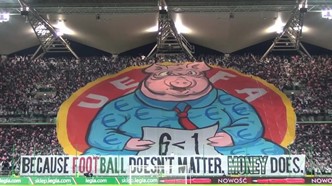
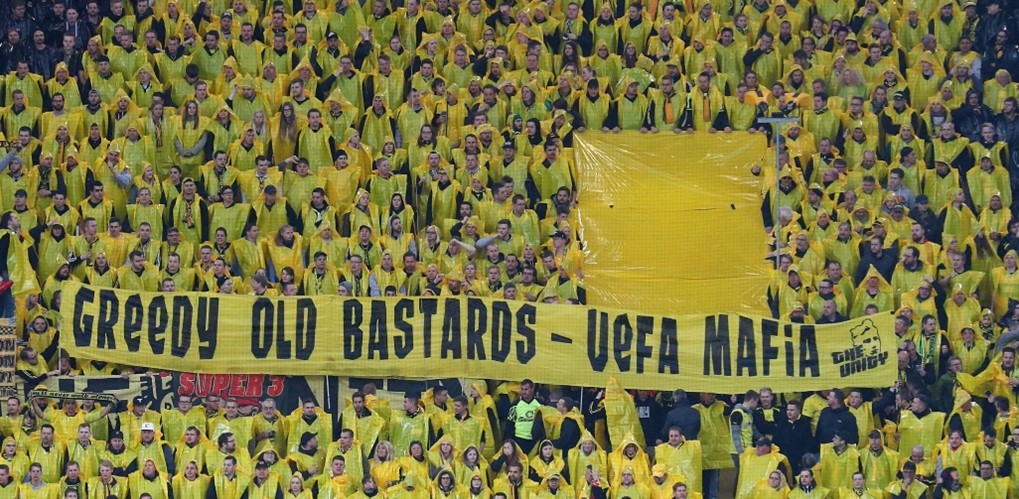
“You need at least sixteen pigs to finish the job in one sitting, so be wary of any man who keeps a pig farm. They will go through a body that weighs 200 pounds in about eight minutes. That means that a single pig can consume two pounds of uncooked flesh every minute. Hence the expression, "as greedy as a pig".
Brick Top – Snatch (2000)
World governing body Fifa, an organisation plagued with high profile chicanery under previous incumbent Sepp Blatter and whose current boss Gianni Infantino, was under criminal investigation for corruption and implicated in the infamous Panama Papers scandal, fired the first shots across the bow and said they would not recognise such a competition and any players involved in it would be denied the chance to play at a World Cup.
UEFA, themselves incriminated in a glut of profound financial malfeasance that saw both President Michel Platini sanctioned and removed from his post, issued a joint statement with the Italian Football Federation, the Spanish Football Federation, and the English Premier League, all of whom have also been previously embroiled in humiliating corruption scandals, with perhaps the Italians leading the way.
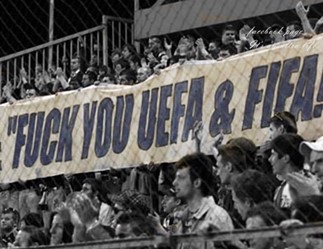
The communique made it clear that all measures, at all levels, both judicial and sporting would be under consideration in order to prevent the Super League project from starting.
Then came an unexpected intervention from the much-maligned PM Boris Johnson, a man heading up a morally bankrupt Government in the midst of a sleazy corruption and cash for cronies’ palm greasing scandal, who likened the new Super League to a cartel in an opportunist attempt to popularise himself with a fan base that neither he or his political party have ever had any affinity with. His incongruous anti-capitalist response to the Super League confirms what Michael Heseltine said of him – He is a man who waits to see which way the crowd is running, and then dashes in front and says “follow me.”
The irony of this rotten collective taking the moral high ground in a greed-fuelled, self-serving power struggle for the right to control the game and fleece fans is palpable. And the UEFA Mafia, as football’s Ultras view them, seeking the backing of supporters must be the greatest irony in the history of football. The capacity for greed and hypocrisy is astonishing. This cannot be understated.
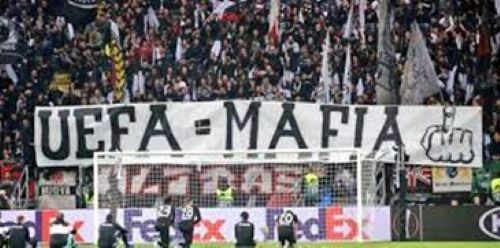
FIFA is awash with cash. President Gianni Infantino’s 2019-20 payment package was estimated to be $3.3 million, with FIFA reserves said to be in the region of $2.74 billion and a revenue stream reported to be around $6.4 billion. They’re unquestionably in a financial position and have a moral obligation to do so much more to progress football, particularly in developing countries. They choose not to. Instead, they prefer to hoard the wealth.
UEFA revenue for the pandemic hit 2019-20 season was down from €3.85 billion for the 2018-19 season to €3.03 billion. The last European Championships also netted them a cool €1.69 billion and the governing body has around €2 billion in assets. The cake is clearly big enough to afford everyone an equitable slice but UEFA trouser the loot. Every aspect of its business model is unashamedly geared towards corporate pandering, augmenting revenue streams and servicing football’s elite to ensure glamour finals their sponsor's clamour for.
…Money, It's a crime, Share it fairly, But don't take a slice of my pie…
UEFA’s failed 2011 financial fair play proposals, sold to supporters as a playing field leveller, levelled nothing. On the contrary, it served up yet more scope for footballing’s premier clubs to profit from commercial gain, reinforcing the belief that money, greed and dividends have replaced glory, loyalty and passion.
FIFA and UEFA portraying themselves as progressive custodians of the game is an illusion of truth. Look into my eyes, not around the eyes. They are the enemy within football and both are guilty of facilitating greed, betrayal and corruption. Snouts so deep in the trough that it covers their ears. Football’s governing bodies have been complicit in the modern football phenomenon that has all but destroyed traditional fan culture and erased over 100 years of tradition. If they cared, football would be affordable and accessible to all. It isn’t.
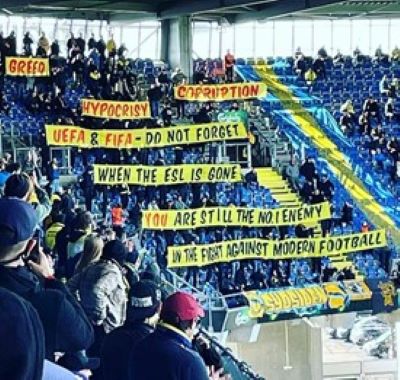
Under the rapacious governance of UEFA, football has never been more predictable. The Independent’s Miguel Delaney’s 2020 analysis exposed the effects of the uneven distribution of the game’s wealth in a decade where we have seen 100 point seasons, multiple trebles and domestic trebles in Europe’s high profile Premier leagues. No fewer than 10 European leagues, including Italy, Portugal and Scotland, have seen teams play out the whole season unbeaten and Real Madrid’s 2016-18 European Cup successes were the first three in a row since Bayern Munich over 40 years ago.
There is clearly such a sneering attitude towards footballs proud working-class fan base that they’ve tried, and in many ways succeeded, to freeze them out with their vastly inflated ticket pricing structure. We see clubs; they see brands. We see players; they see assets. We see supporters; they see customers. We see competitions; they see revenue streams. We see a sport; they see a product. Every aspect of football is geared towards the maximisation of profit and its supporters who inevitably fund it both directly and indirectly.
And yet these are the same grassroots supporters who have never mattered less than they do today, who set rivalries aside and mobilised, strengthening UEFA’s stance by voicing their media-driven collective outrage in condemning the new European Super League proposal. Fans and supporter’s groups publicly damned their club’s involvement in the latest of football’s get rich quick schemes and lambasted their billionaire owners for daring to drag their storied clubs into such a melting pot of control and greed.
Supporter outrage speedily gathered momentum and the media frenzy surrounding the controversial new plans saw Manchester City become the first team to pull out soon after Chelsea had signalled their intent to do so by filing documentation to withdraw. The other English teams followed suit shortly afterwards after being publicly shamed by their own supporters into performing the same embarrassing U-turn. A measly 48 hours after the coup began, it was over. The message from the supporters is clear. Football is not for franchise.
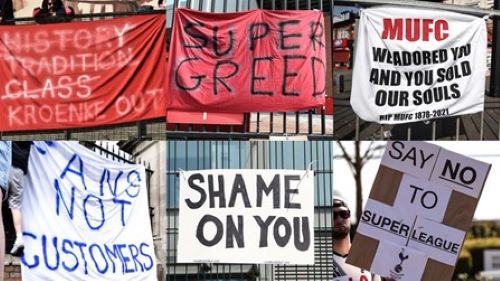
But the notion that a few hundred supporters waving bits of card and hanging banners outside stadiums forced this embarrassing capitulation is very questionable. J.P. Morgan is the go-to investment banking institution. A prestigious global finance organisation that doesn’t back losers. Agnelli, Henry, Kroenke, Levy, Sheikh Mansour and the Glazers are super savvy, switched on businessmen with a track record of success. Losing is not in their vocabulary. They certainly wouldn’t turn up to a gunfight brandishing a novelty pen knife as appears to be the case here. And the damage limitation exercise that followed the mass withdrawal was arguably stage-managed weapons-grade cringe that reeked of insincerity. Sadly, we are living in a time where truth has been so diminished in value that those in the higher echelons of prominence are quite comfortable with the truth being whatever they can convince fans to believe.
There are too many pieces of the jigsaw missing to make an evidenced hypothesis, but don’t rule out a strategic defeat with a hint of managed collateral. The new Super League appears to be dead in the water but maybe all is not what it seems. A resurrection is inevitable. It’s just a case of when and in what format.
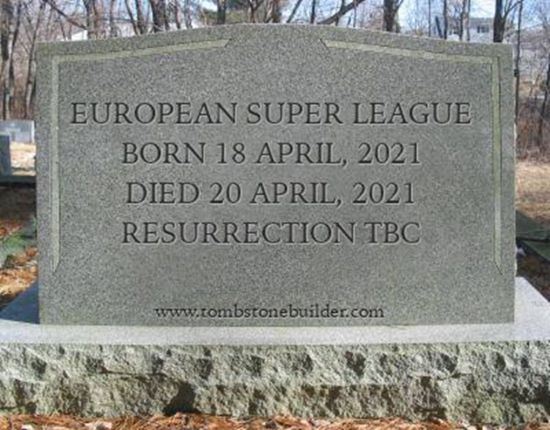
Eleven of the 12 clubs that signed up for the ill-fated Super League had a combined £1.2 billion operating loss in the 2019-20 season even though only the last 3 months of the season were impacted by the pandemic. AC Milan, Juve, Man City and Barcelona were the four biggest losers.
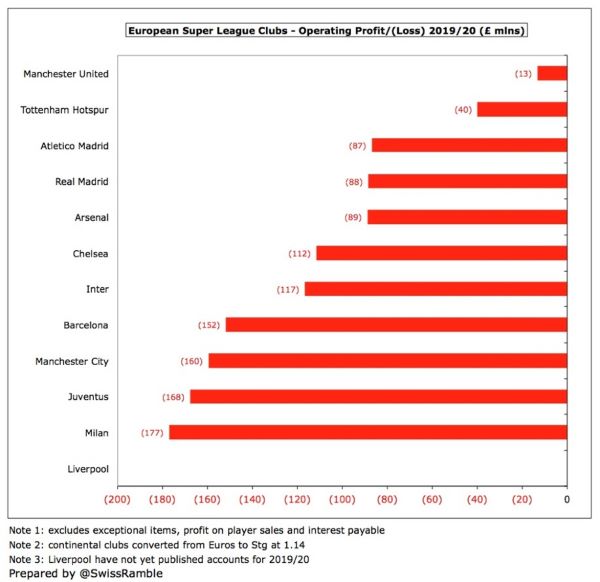
Reckless decadence is the primary reason for the debt most clubs find themselves saddled with, not the pandemic. The only way to fund their industrial-scale overindulgence was to augment income with a quick fix pre meditated cash grab in what turned out to be a brief scorched earth dalliance that threatened to burn their Premier League counterparts. A grubby self-serving move that could yet see them reach pariah status. The consensus has already made it clear that they’d be happy for the greedy six to be heavily sanctioned. Expelled even. But there will be no weeping or gnashing of teeth. The breakaway six are key components to the success of the Premiership brand so there will be no appetite to impose significant penalties for their betrayal. UEFA however, are sabre-rattling. They’re threatening to dole out serious sanctions. But talk is cheap. The ‘dirty dozen’ are also pivotal to the prosperity of the Champions League brand and with the governing body’s history of kowtowing to the footballs elite, I don’t envisage any exclusion from European competition for their part in the failed coup.
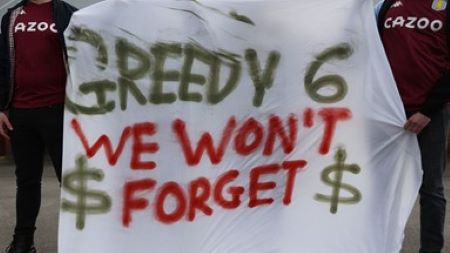
The shelved Super League was not a welcoming progression, it was just another overt attempt to change the game’s DNA and further exploit long-suffering supporters. If the fallout from the pandemic has taught us anything it’s that football without fans is nothing. They’re an integral part of the product. The lack of recognition afforded to them for the part they play, their culture and the history connected to many of the celebrated clubs they support is still massively evident. Regrettably, immersing themselves into club culture and heritage is not a prerequisite of ownership. The focus is solely on finance and profitability. Business and fandom appear to be irretrievably incompatible. Like oil and water, they perfectly repel. It’s often the underlying cause of the toxic relationships between owners and supporters that have been dominating footballing headlines in recent years.
Football is in desperate need of reform and UEFA’s greedy monopoly on the domestic game does need challenging but not by an entity that seeks to become a greedier version of the one it is seeking to replace. A governing body has a duty to represent and engage with all of its 55 member associations and address the economic inequalities that facilitate the vast sporting and financial advantages afforded to football’s elite. There must be a commitment to stop the reckless decadence and replace it with a salary cap driven sustainable business model that levels the playing fields and broadens income distribution down to the lower echelons of the footballing food chain.
Tuesday’s victory is a welcome stay of execution but nothing has changed. Ticket prices are still excessively inflated with limited availability to grassroots supporters, typically due to pricing and corporate demand, particularly in UEFA competitions. Merchandise is still vastly overpriced, food and drink sold in stadiums is still prohibitive and the continuing uneven distribution of wealth ensures the status quo remains. Ironically though, it’s the fans who enable much of this madness. They hold all the cards but refuse to play the winning hand, because just like junkies they’re hopelessly addicted to the product, regardless of the quality. It’s a way of life they subscribe to and they deserve so much more for their unwavering commitment in the face of such pernicious profiteering.
All this money swashing about in football has predictably led to inflation. Nothing is immune. Transfer fees, wages, agent’s fees, tickets, merchandise etc. Those costs are invariably passed on to the supporters and that’s why top-flight football is abandoning its working-class roots. Working-class supporters are not in a position to sustain the kamikaze overindulgence some clubs consent to.
Football is lost. Business has consumed it and globally commercialised it for monstrous profit, of which the lion’s share is taken out of the game that produced it, with football’s governing bodies and super agents like Jorge Mendes and Mino Raiola being amongst the worst offenders. It’s the global appeal and the opportunity to generate exponential wealth that has attracted the oligarchs, Arabs and American billionaires to invest in the game and investment is the prerequisite for success if invested responsibly, with Liverpool FC being the obvious benchmark.
But Tuesday’s victory, whether fans were responsible for it or not, has invigorated supporters and given them fresh impetus that they need to build on. There is clearly an appetite for reform and change has to be forthcoming if what’s left of the working class fan base is to survive. However unlikely, the obvious goal is the German ‘50+1’ model that affords fans a 51 per cent share of their club and prevents private investors from pushing through measures that prioritise profit over the wishes of supporters. The ‘50+1’ rule also helps to keep operating costs and debt under control and is the primary reason why ticket prices remain affordable compared to other major leagues in Europe.
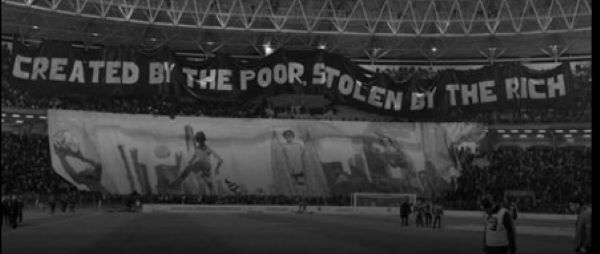
Incensed by the Super League debacle, fan dissent has reached a new nadir. Supporters groups of the breakaway six are reporting an unprecedented surge in uptake for membership. Chelsea’s Supporters’ Trust saw their website crash due to a deluge of applications, Arsenal’s Supporters’ Trust saw a 50 per cent increase, Tottenham Hotspur Supporters’ Trust received 5,000 emailed membership queries that almost crashed their server and Liverpool’s Spirit of Shankly football union have urged applicants to be patient whilst they deal with a huge backlog. If this conviction cascades down the league and proves to be the catalyst for a unified uprising it could be a game-changer.
Football is crying out for a revolution because grassroots fans are in hell right now. The Super League fiasco just reinforced that viewpoint. The time has come for supporters to take a meaningful fight against the game’s billionaire owners and demand a say in how their clubs are run and it’s time for owners to participate in meaningful engagement that affords them that say. Fan unity is key. With unity comes strength and to quote Bertolt Brecht: “He who fights can lose. He who doesn’t fight has already lost.” I wish them well…..Viva La Revolución ….AGAINST MODERN FOOTBALL.
Membership details for the breakaway six supporters groups:
https://spiritofshankly.com/membership/
https://www.arsenaltrust.org/join
https://chelseasupporterstrust.com/membership/
Shaun Duffy



